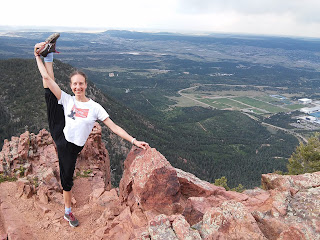Now for a more practical blog: what podcasts would I recommend? I have started to listen to quite a few podcasts that inspire me a lot! Many of them are about ballet, kind of obviously ;-) But I think also the ballet ones teach me quite a bit about life in general. Let me walk through my current facvourites, sorted by topic:

Picture by Michel Le Photography
at Morlaix Ballet camp
Contemplation
- Mind & Life podcast (I was super-honoured to be featured on this one myself!) in which people are interviewed that work on the intersection of research and contemplative practice. I find these always such fascinating conversations!
- Open Question by Elisabeth Mattis-Namgyel, an amazing Buddhist teacher who presents a no-nonsense approach to asking deep questions in life
- The kind heartfulness podcast by Gomde Austria, an interesting series of conversations with Buddhist teachers and practitioners.
Ballet
- A dancer's mindset by Isabella McGuire, who talks about the mindset that is required to be successful at anything, but especially from the perspective of ballet. Lots of good advice, although I don't always agree with everything. I think she forgets that not everything can be controlled
- Athletistry by Shane Wuerthner, another ballet mindset podcast, which is also useful to anyone engaged in a difficult pursuit, such as academia
- Ballet Rising by Casey Herd: fascinating stories about people trying to bring ballet to the communities that not always get access to it, e.g., ballet in India and Africa
- Hard Corps podcast by Romee Adair, who talks with guests about the general dance industry and especially challenges within it. It's fascinating to learn more about how the dance industry works.
- The adult ballet studio by Elisabeth Blosfield, a series of conversations with people trying to make a space for amateur adult ballet dancers. So inspiring!
- The balanced ballerinas podcast by Georgia Dostal, a series of interviews with so many amazing people in the dance world. Again, so many interesting things to learn!
- Artists Becoming, another series of conversations with dance professionals, but this one is specifically focused on bringing out the artists, and challenges to that
- Moving Moments by Alicia Graf Mack: more conversations with dance arists. I just love hearing the person behind the dance artist!
- The turning: Room of Mirrors: a really interesting deep dive into the ballet choreographer Georges Balanchine. Very interesting although this one is a bit on the sensationalist side
- Broche banter by Julie Gill/Leung: all things adult ballet, including interviews with adult amateur ballet dancers. Lots of insightful stuff about how adults learn ballet
Academia
- Degrees of freedom by Tassos Sarampalis and Marcello Seri: lots of philosophy and practical tips about teaching in academia.
I hope some of these are inspiring to you, and maybe you find some new ones to listen to!












